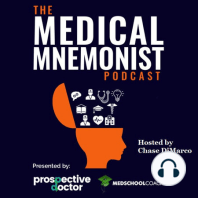36 min listen

69 Tackling Medical Exams and Flashcards with Dr. Ali Abdaal
69 Tackling Medical Exams and Flashcards with Dr. Ali Abdaal
ratings:
Length:
30 minutes
Released:
Sep 3, 2020
Format:
Podcast episode
Description
Dr. Ali Abdaal discusses evidence-based study methods for medical students, tips for using medical flashcards, and the role of fun in productivity. Dr. Abdaal is a FY2 physician in the UK and a successful YouTuber with over a million subscribers. [01:36] Evidence-Based Study Techniques [04:55] Anki and Other Flashcard Apps [06:35] Mnemonics and Memory Palaces [08:27] Tips for Using Flashcards [12:36] Defining Productivity & How to be Productive [14:44] How to Overcome Common Productivity Struggles [16:45] The Role of Fun in Learning & Productivity [21:00] Avoiding the Professional “Conveyor Belt” and Achieving Happiness Dr. Ali Abdaal is co-host of his own podcast Not Overthinking, but in this episode of The Medical Mnemonist, he discusses two evidence-based study techniques used in his medical studies – active recall and spaced repetition. Dr. Abdaal is also a fan of mnemonic devices. As a medical student, he recalls creating silly mnemonics with his friends. For example, to remember the side effects of pyrazinamide, which is a treatment for tuberculosis, he associated it with the Islamic concept of “zina” or premarital sex which is prohibited. Another act that is prohibited in Islam is drinking alcohol, which damages the liver. Therefore, a negative side effect of pyrazinamide is damage to the liver. Using mnemonic devices falls within Ali’s larger belief that having fun is key to productivity. He shares his “productivity equation” which is: Productivity = (Useful Output/Time) x Fun Another fun and effective study method that he used in medical school was having pomodoro sessions with his friends. A pomodoro session consists of 25 minutes of studying, and then a 5-minute break, repeated over and over again. Although Dr. Abdaal prioritizes fun, he believes that action precedes motivation — a concept that he gleaned from the book, The Motivation Myth by Jeff Haden. Often, people believe that they need the motivation to accomplish something. However, it is more accurate that we get motivation after achieving small milestones in our actions & efforts. Thus, the best productivity tip is to just start. As a mental model for productivity, Dr. Abdaal encourages us to consider the analogy of the pilot, plane and engineer. The pilot plots the course, the plane does the work, and the engineer tweaks and optimizes these processes. Ali believes that we should spend 85% of our time being the pilot – planning our tasks, 10% of our time being the plane – doing our work, and 5% of our time being the engineer – optimizing our productivity, say by learning how to type faster or trying out a new productivity app. With regards to using medical flashcards, Dr. Abdaal leans towards personalized flashcards which condense lots of information, rather than generic sets of flashcards which contain a single fact each. When using a generic set of single-fact flashcards, we might develop the illusion of productivity by rushing through the set, without really learning anything, or rehashing information that we know well already. Instead, we should consider using flashcards specifically for topics which confuse us. And it is likely better if these flashcards integrate different pieces of information, rather than single facts because this is how information exists in real life — within the context of other information. He also shares his fear about falling into the “conveyor belt” of professional life. As medical students, it is easy to keep saying “I will be happy when I get accepted into my residency program” and then later, “I will be happy once my residency is over and I am an attendant.” The cycle could go on and on. Dr. Abdaal even fears that his idea of doing his Step 1 IMG in the U.S. might come from a fear of not having another exam in front of him. He encourages us to ask ourselves the question “What game am I playing, and do I want to be playing this game?” Each of us needs an “economic engine” or a way to make money. However, Dr. Abdaal encour
Released:
Sep 3, 2020
Format:
Podcast episode
Titles in the series (99)
23 Visual Mnemonic Generation with Ron Robertson of Picmonic: When trying to create visual mnemonics for medicine, there are few places that students can go for comprehensive examples. But one of those places that needs no introduction is Picmonic. Since 2011, Picmonic has been bringing graphic representations of e. by Medical Mnemonist (from MedSchoolCoach)